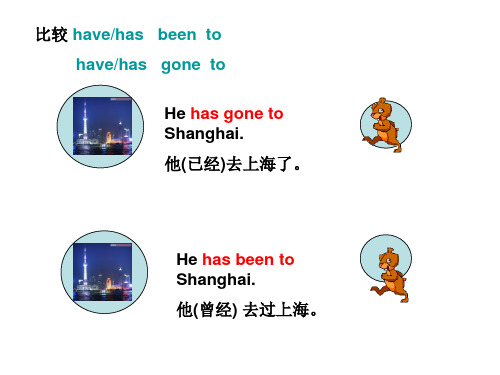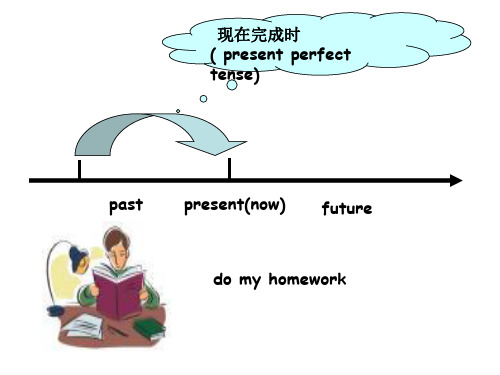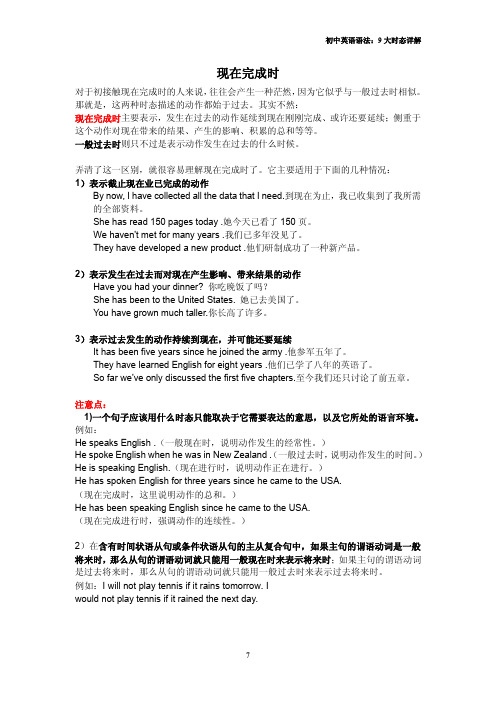初中时态讲解:现在完成时
- 格式:doc
- 大小:128.00 KB
- 文档页数:9

现在完成时的构成与用法初中语法解析现在完成时是英语中一个重要的时态,表示过去某个时间开始的动作或状态一直延续到现在,或者过去某个时间内发生的动作对现在产生的影响。
在初中阶段学习英语的同学们需要掌握现在完成时的构成和用法。
一、现在完成时的构成现在完成时的构成由“have/has + 过去分词”组成。
1. 构成肯定句:主语 + have/has + 过去分词。
例如:- I have visited Beijing many times.- She has finished her homework.- They have lived here for five years.2. 构成否定句:主语 + have/has + not + 过去分词。
例如:- I haven't seen him for a long time.- She hasn't learned how to swim.- They haven't completed the project yet.3. 构成疑问句:Have/Has + 主语 + 过去分词?例如:- Have you ever been to France?- Has she read this book before?- Have they finished their lunch?二、现在完成时的用法1. 表示过去经历或经验现在完成时经常用来谈论过去的经历或经验,指出过去发生的事情对现在产生的影响。
例如:- I have visited many countries, so I know a lot about different cultures. (我去过很多国家,所以对不同的文化有很多了解。
)- She has worked in this company for five years, so she has a lot of experience. (她在这家公司工作了五年,所以她有很多经验。

现在完成时1.表示截止现在业已完成的动作eg By now, I have collected all the data that I need.2.表示发生在过去而对现在产生影响、带来结果的动作eg She has been to the United States.3.表示过去发生的动作持续到现在,并可能还要延续eg I have learned English for 8 years.基本结构由 have 加动词的过去分词构成,主语是第三人称单数时,要将 have 改为has。
例句:I have seen the film already. 我已经看过那部电影了。
(现在我知道电影的内容了。
)Have you seen my bag? 你看到我的手提包了吗? (你知道它在哪里? )She has been a dancer for ten years. 她已当了十年的舞蹈演员了。
We’ve planted thousands of trees in the past few years. 过去几年我们种了成千上万棵树。
时态用法对于初接触现在完成时的人来说,往往会产生一种茫然,因为它似乎与一般过去时相似。
那就是,这两种时态描述的动作都始于过去。
其实不然,现在完成时主要表示,发生在过去的动作延续到现在刚刚完成、或许还要延续;侧重于这个动作对现在带来的结果、产生的影响、积累的总和等等。
而一般过去时则只不过是表示动作发生在过去的什么时候。
弄清了这一区别,就很容易理解现在完成时了。
它主要适用于下面的几种情况:1)表示截止现在业已完成的动作By now, I have collected all the data that I need .到现在为止,我已收集到了我所需的全部资料。
She has read 150 pages today .她今天已看了150页。
We haven't met for many years .我们已多年没见了。


目前完毕时解说第一部分:目前完毕时表达过去发生或已经完毕旳动作对目前导致旳影响或成果,也可表达过去已经开始,始终延续到目前旳动作或状态。
学习目前完毕时,先从构造和句式开始:构成:主语 + have/ has + 过去分词 + 其他(当主语是第三人称单数时用has,其别人称用have。
过去分词:规则动词旳过去分词构成与动词过去式相似;不规则动词需要特殊记忆。
)否认式:主语 + haven’t /hasn’t+过去分词 + 其他疑问式:Have / Has +主语+过去分词 + 其他?简略答语:Yes, 主语 + have / has.(肯定)No, 主语+haven’t/ hasn’t.(否认)第二部分:目前完毕时旳含义之一是过去完毕旳动作对目前仍有影响,用如下四大标志词可以体现这种含义:1.以already, just和yet为标志already, just和yet表达到目前为止动作或状态已经、刚刚或还没有发生。
He has already gother help. 他已得到她旳协助。
He has just seen the film. 他刚刚看过这场电影。
He hasn’tcome back yet.他还没有回来。
2.以ever和never为标志ever和never表达到目前为止动作或状态曾经或历来没有发生过。
This is the best filmIhave everseen. 这是我曾经看过旳最佳旳一部电影。
He has never beento Beijing. 他从没有到过北京。
3.以动作发生旳次数为标志若某一动作到目前为止已经发生了若干次,则要使用目前完毕时。
He says he has been to the USA three times. 他说他已经去过美国三次了。
4.以so far为标志ﻫsofar往往表达到目前为止动作或状态已经发生。
He hasgot to Beijing so far. 到目前为止他已到了北京。


现在完成时对于初接触现在完成时的人来说,往往会产生一种茫然,因为它似乎与一般过去时相似。
那就是,这两种时态描述的动作都始于过去。
其实不然:现在完成时主要表示,发生在过去的动作延续到现在刚刚完成、或许还要延续;侧重于这个动作对现在带来的结果、产生的影响、积累的总和等等。
一般过去时则只不过是表示动作发生在过去的什么时候。
弄清了这一区别,就很容易理解现在完成时了。
它主要适用于下面的几种情况:1)表示截止现在业已完成的动作By now,I have collected all the data that I need.到现在为止,我已收集到了我所需的全部资料。
She has read150pages today.她今天已看了150页。
We haven't met for many years.我们已多年没见了。
They have developed a new product.他们研制成功了一种新产品。
2)表示发生在过去而对现在产生影响、带来结果的动作Have you had your dinner?你吃晚饭了吗?She has been to the United States.她已去美国了。
You have grown much taller.你长高了许多。
3)表示过去发生的动作持续到现在,并可能还要延续It has been five years since he joined the army.他参军五年了。
They have learned English for eight years.他们已学了八年的英语了。
So far we've only discussed the first five chapters.至今我们还只讨论了前五章。
注意点:1)一个句子应该用什么时态只能取决于它需要表达的意思,以及它所处的语言环境。
例如:He speaks English.(一般现在时,说明动作发生的经常性。
现在完成时结构:have/has + V过去分词(P111)定义:1)一个发生在过去的动作对现在造成的影响或结果。
常与already, yet, ever, never, just,before 等词连用。
例如:Have you had supper yet? 你吃晚饭了吗?You have already grown much taller. 你已经长高了许多。
2)一个动作发生在过去,持续到现在,并可能还要延续。
常与表示一段时间的时间状语连用(如:for 2 years,since2001)It has been five years since he joined the army . 他参军五年了。
They have learned English for eight years . 他们已学了八年的英语了。
动词原型变过去分词规则表动手练习1.我已经做作业了。
2.我还没有做作业。
3.你做你的作业了么?(肯) , (否)4.他读过这本书。
5.他没读过这本书。
6.他读过这本书么?(肯) , (否)现在完成时需注意的问题:非延续性动词(如begin ,borrow, lend ,buy ,close ,come, die, finish, join, leave, receive等)不能与表示一段时间的状语连用。
例如:He has joined the army for five years. (错)He has been in the army for five years. (对)注意:非延续性动词的否定形式可以与表示一段时间的状语连用。
即动作不发生的状态是可以延续的。
I have received his letter for a month. (错)I haven't received his letter for a month. (对)(常见短暂性动词变延续性动词表)borrow→keep,receive→getbuy→havedie→be deadopen→be openend/finish →be overbegin/start→be onjoin→be inleave→be awaygo there →be therefall asleep→be asleep,reach/arrive/get to→be in。
一、时态讲解:现在完成时(1)构成:现在完成时由助动词have+过去分词构成,助动词have 有人称和数的变化。
第三人称单数用has,其余用have.现在完成时的否定式直接在助动词后面加上not、疑问式是把助动词提到主语之前。
以study为例,其否定式、疑问式和简单tenyears,awhile,twodays等。
Exercise:用since和for填空1.JimhasbeeninIreland______Monday.2.JillhasbeeninIreland______threedays.3.HisaunthaslivedinAustralia______15days.4.Maryisinheroffice.Shehasbeenthere______7o'clock.5.Indiahasbeenanindependentcountry______1974.6.Thebusislate.They'vebeenwaiting______20minutes.7.Nobodylivesinthosehouses.Theyhavebeenempty______manyyears.8.Mikehasbeenill______alongtime.Hehasbeeninhospital______October.2)表示短暂意义的动词如arrive,leave,borrow,buy,begin,start,die等,在完成时当中不能和表示一段时间的状语连用,因为它们表示的动作不可能持续。
因此,不能说:Hehascomeherefor2weeks.×Theoldmanhasdiedfor4months.×Theyhav eleftonlyfor5minutes.×2)IrregularVerbs-来源网络,仅供个人学习参考I.Fillintheblankswiththeproperform.1.I____already____(see)thefilm.I________(see)i tlastweek. ArrayA.attheageofmy2B.for2yearsC.whenIwas2.D.myagewas6.3.Janehas_____toBeiJing.Shewillcomebacktomorrow.A.beenB.goneC.wentD.neverbeen-来源网络,仅供个人学习参考4.Itistenyears_____Ilastsawher.A.afterB.sinceC.forD.that5.--WhowillgotothestationtomeetLorry?--Iwill.I_____herseveraltimes.A.metB.havemetC.hadmetD.willmeet6.--Whatanicedress!Howlong_____you_____it?I____just____anewbike.4.WebegantolearnEnglishthreeyearsago.(改为同义句)We________English____threeyears5.Hehasneversurfed,______________?(改成反意疑-来源网络,仅供个人学习参考问句)6.Theyhavebeenheresince2000.(对划线部分提问)______________havetheybeenhere?7.Theoldman_________lastyear.Hehas______________forayear.(die)(动词填空)8.MissGaoleftanhourago.(同义句转换)2.我刚刚丢了我的化学书。
1 / 9 初中时态讲解:现在完成时 1)构成:现在完成时由助动词 have+ 过去分词构成,助动词have 有人称和数的变化。 第三人称单数用has,其余用have. 现在完成时的否定式直接在助动词后面加上not、疑问式是把助动词提到主语之前。以study为例,其否定式、疑问式和简单回答形式如下:
(2)用法: 1)现在完成时通常表示在说话之前已经完成的动作或存在的状态。说话人强调的是该动作或状态对现在的结果或影响。 My daughter has just gone out. 我女儿刚出去。 I’m sure we’ve met before. 我肯定我们以前见过面。 She has arrived. 她到了。 2)表示持续到现在的动作或状态,往往和包括现在在内的表示一段时间的状语连用, 如recently, already, just, lately, for…, since…,yet 等。如: I haven’t heard from her these days. 这些日子我没有收到她的信。 We haven’t seen you recently. 最近我们没有见到你。 They have been away for two years. 他们离开已经两年了。 She has been with us since Monday. ★注意: a)since和for的区别 since后接时间点,如1993,last term, yesterday, the time I got there for后接一段时间,表示长达多久”,如ten years, a while, two days等。 Exercise: 用since和for填空 1. Jim has been in Ireland ______ Monday. 2. Jill has been in Ireland ______ three days. 3. His aunt has lived in Australia ______15 days. 4. Mary is in her office. She has been there ______ 7 o'clock. 5. India has been an independent country ______1974. 6. The bus is late. They've been waiting ______ 20 minutes. 7. Nobody lives in those houses. They have been empty ______ many years. 8. Mike has been ill ______a long time. He has been in hospital ______ October. 2)表示短暂意义的动词如 arrive, leave, borrow, buy, begin, start, die等,在完成时当中不能和 表示一段时间的状语连用,因为它们表示的动作不可能持续。因此,不能说: 2 / 9
He has come here for 2 weeks. × The old man has died for 4 months. They have left only for 5 minutes. 以上三句话可以改为: He has been here for 2 weeks. The old man has ______ _______ for 4 months. They have _____ _____ only for 5 minutes 2)have (has) been 和have (has) gone的区别: 表示“曾到过某地”要用“have (has) been”; 表示 “已经去某地 ”要用“have (has) gone”。试比较: Where has he been? 他刚才到哪里去了?(已经回来了) Where has he gone? 他上哪儿去了?(人不在) They have been to Canada. 他们到过加拿大。(现在已经不在加拿大) They have gone to Canada. 他们到加拿大去了。(可能在路上和已经到加拿大) 3)现在完成时不能和表示过去的时间状语连用,如 yesterday, last year, in 1976, two days ago, just now, when I came in, 但是可以和already, yet, sometimes, always, often, before, lately, recently, once, twice, ever, never等连用。例如: She has already come. 她已经来了。 I haven’t read it yet. 我还没读过这个。 I have met him before. 我从前曾见过他。 Ma Hong has always been a good student. 马红一直是个好学生。 I have often seen him in the street. 我经常在街上看见他。 They have never been to Yan’an. 他们从未去过延安。 I haven't seen him lately. 我近来没看到他。
Irregular Verbs ()见附件) Exercise: I. Fill in the blanks with the proper form. 1. I____ already ____ (see) the film. I ________ (see) it last week. 2. _____ he ____ (finish) his work today? Not yet. 3. My father ____ just ____ (come) back from work. He is tired now. 4. Where’s Li Ming ? He __________ (go) to the teacher’s office. 5. I __________ (work) here since I ______ (move) here in 1999. 6. So far I _______________(make) quite a few friends here. 7. How long ________ the Wangs ______________(stay) here ? For two weeks. 8. I ________ just ___________ (finish) my homework. 9. He ________ (go) to school on foot every day. 10.____ you ______ (find) your science book yet? 11. If it ____ (be) fine tomorrow, I'll go with you. 12. The students ____________ (read) English when the teacher came in. 13. Look! The monkey __________ (climb) the tree. 14. My mother __________ (come) to see me next Sunday. 15. I've lost my pen. _________ you ________ (see) it anywhere? 3 / 9
II. Choose the best answer. 1. How long have you _______ here? A. come B. got C. arrived D. been 2. My grandpa died _________. A. at the age of my 2 B. for 2 years C. when I was 2. D. my age was 6. 3. Jane has _____ to BeiJing. She will come back tomorrow. A. been B. gone C. went D. never been 4. It is ten years _____ I last saw her. A. after B. since C. for D. that 5.--Who will go to the station to meet Lorry? --I will. I _____ her several times. A. met B. have met C. had met D. will meet 6. --What a nice dress! How long _____ you _____ it? --Just 2 weeks. A. will, buy B. did, buy C. are, having D. have, had 7.--Do you know Lydia very well? --Yes, She and I _____ friends since we were very young. A. have made B. have become C. have been D. have turned 8. The Smiths _______ in China for 8 years. A. has lived B. lived C. have been D. live 9. --Hello, this is Mr. Green speaking. Can I speak to Mr. Black? -- Sorry. He ______ the Bainiao Park. A. has been to B. has gone to C. went to D. will go to 10. --____ you ever ____ to the US? -- Yes, twice. A. Have, gone B. Have, been C, Do, go D. were, going III. Rewrite the sentences. 1. I have been to Macau before. ( 改为否定句 ) I _________ _________ been to Macau before. 2. He hasn’t come to school because he was ill. (就划线部分提问) ______ _______ he come to school? 3. I bough a new bike just now. (用just改写) I ____ just ____ a new bike. 4. We began to learn English three years ago.(改为同义句) We ____ ____English ____three years 5. He has never surfed, _______ _______? (改成反意疑问句) 6. They have been here since 2000. (对划线部分提问) _______ _______have they been here? 7. The old man _________ last year. He has _______ _______for a year. (die) (动词填空)